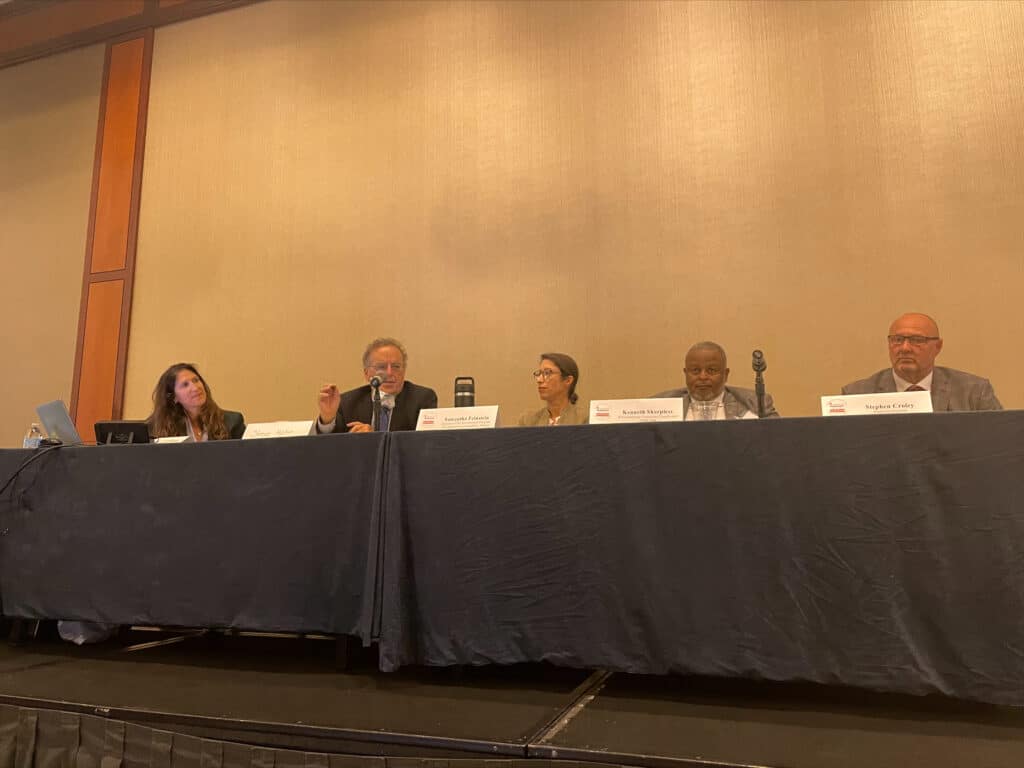Joined by other prominent voices in public and private sector whistleblowing, whistleblower attorney Stephen M. Kohn appeared at this year’s Association of Inspectors General Annual Training Conference in Washington, D.C.
Kohn, the Chairman of the Board of the National Whistleblower Center (NWC) sat alongside Samantha Feinstein, Staff Attorney and the Director of the International Program at Government Accountability Project (GAP), Stephen Croley, the Bureau of Naval Personnel’s Inspector General, and Kenneth Sharpless, Whistleblower Protection Coordinator at the Department of Defense (DoD) Office of the Inspector General.
The audience was comprised of over 200 people in inspector general roles and related fields across local, state, and federal offices, as well as private companies.
The panel was moderated by Sheryl Goodman, president of Procurement Integrity Consulting Services, LLC, which offers consulting services in areas of procurement, whistleblower protection and complaint intake systems.
Kohn, who is also a founding partner at Kohn, Kohn & Colapinto LLP, described the success of whistleblower-led cases under the False Claims Act (FCA). The U.S. Department of Justice annually publishes its “Fraud Statistics,” which reported that since 1986, over $48 billion has been collected in qui tam cases.
Cases initiated purely by government investigation only saw collections amounting to $21.9 billion in the same amount of time.
“Two to one,” Kohn said in reference to the difference between the amount of collections. “Two to one. That is 48 billion reasons why whistleblowers have credibility and need to be responded to. You have a working program objectively superior to any other civil fraud program out there.”
Since 1986, over 14,595 qui tam referrals, investigations, and actions have taken place through the FCA, exposing crime worldwide.
“The False Claims Act and all of today’s laws are not necessarily about whistleblowing, but are a means to an end,” Kohn said. “They’re a mechanism to uncover white-collar crime and well-hidden frauds. The primary beneficiary of the laws is the deterrent effect of the enforcement actions on future crimes.”
Feinstein, who has been a whistleblower lawyer with GAP since 2017, walked attendees through some best practices for Inspectors Generals working with whistleblowers. These included the honoring of commitments to the whistleblowers, the importance of a safe environment complete with active listening and empathy, constant quality control of the record, and honesty when describing the possible boundaries of protection a whistleblower may have.
During the Q&A section of the event, an audience member asked the panelists how to best advise a potential whistleblower who begins to waver on whether they want to pursue a case due to fear of backlash or retaliation.
“The Dodd-Frank Act requires anonymity and confidentiality throughout the process,” Kohn explained. “It also requires federal agents to not disclose any information that could possibly lead to the identification of a whistleblower.”
Keeping a source secretive can absolve some of the fears they may have heading into the process.
“The key is to avoid an employment case, and instead keep the source employed to continue to gather evidence, as seen in Commodities [Futures Trading Commission], Securities [and Exchange Commission], and Internal Revenue Service cases,” Kohn said.
Feinstein described whistleblowers as “brave” people who know the potential consequences yet choose to go forward anyways. She advised those in the inspector general role to do whatever they can for the source’s protection, be honest about any limitations, and build their trust.
Croley also shared some do’s and don’ts from his own experience working with naval personnel. This included a fierce commitment to stopping retaliation, a protection of communication between personnel, an ability to weigh evidence fairly and wholly, and the attention to detail that these whistleblower complaints require.
Croley cited a time in which fifteen complaints arose in one department. Of the 15, only one was sound, though it was still taken seriously and thoroughly investigated.
With his department honing in on establishment, engagement, and accountability, Sharpless of the DoD shared one of the educational videos distributed to the public and to the 3 million plus employees in his department. This video emphasized the ability of all DoD personnel, from service members to civilians to contractors, to report any waste, fraud, or abuse they may see.
“My goal is to listen,” Sharpless said.
